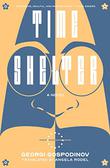For the first time, a Bulgarian novel has won the International Booker Prize.
Time Shelter, written by Georgi Gospodinov and translated by Angela Rodel, was named the winner of the award for “the finest single work of fiction from around the world which has been translated into English and published in the U.K. and Ireland.”
 The prize was announced at a ceremony in London on Tuesday.
The prize was announced at a ceremony in London on Tuesday.
The novel, published in the U.S. last May by Liveright/Norton, follows patients in a Zurich facility for people living with Alzheimer’s disease and dementia. A critic for Kirkus called it “an ambitious, quirky, time-folding yarn.”
Leïla Slimani, the chair of judges for the award, called the book “a brilliant novel, full of irony and melancholy. It is a profound work that deals with a very contemporary question: What happens to us when our memories disappear?”
Gospodinov reacted to his win, saying, “Writers, not only from my country, but also from the Balkans, often feel themselves outside the sphere of English-speaking attention. It is commonly assumed that ‘big themes’ are reserved for ‘big literatures,’ or literatures written in big languages, while small languages, somehow by default, are left with the local and the exotic. Awards like the International Booker Prize are changing that status quo, and this is very important.”
The International Booker Prize was first awarded in 2005. Past winners include The Vegetarian by Han Kang, translated by Deborah Smith, and At Night All Blood Is Black by David Diop, translated by Anna Moschovakis.
Michael Schaub, a journalist and regular contributor to NPR, lives near Austin, Texas.































